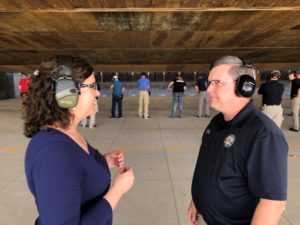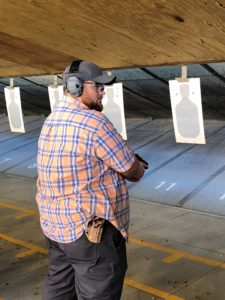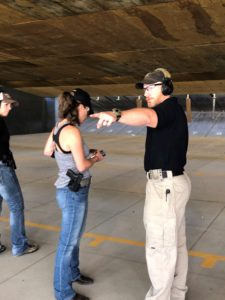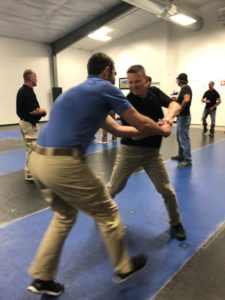LOCHBUIE —When Evan Todd looks at his 6-month-old son, he hopes he will never know the fear of going to school that so many children today do. Todd, the 35-year-old, first-time father and Columbine High School shooting survivor, hopes no child will ever know that fear, so he’s doing something about it.
When Quinn Cunningham gets out of bed each day, he hopes he will never get called out to a school shooting again in his lifetime. The 23-year police veteran says he will spend every day of his life working to make sure no one does.

On their road to those goals, both men found Faculty/Administrator Safety Training and Emergency Response (FASTER) training, and both men have similar stories about why they came to FASTER, stories that today are all to familiar.
Since June 2017, FASTER has hosted four, sold out, three-day courses that train teachers and other school personnel who are contracted with their school districts to act as armed security.
The course focuses on active shooter scenarios — everything from gun safety and how to handle an active shooter, to crisis management and first aid. It is organized by Laura Carno, with the support of the Independence Institute.*
Colorado laws allow school districts to contract with teachers and other staff to act as armed security. Opponents such as Colorado Cease Fire, started by the father of a Columbine High School shooting victim, argue armed staff in schools is not the answer.
But Todd and Cunningham, both of whom have close ties to Colorado school shootings, believe differently.
WEATHER THE WEATHER:

“There are other measures that could help,” said Evan Todd, who was the last survivor of the Columbine shooting in 1999 to speak to the two killers before they took their own lives. “Schools can limit access. They can put in metal detectors. It adds to security and safety, but really, it’s all just a canary in the coal mine. Because in the end, when something starts there is only a few ways it will end, either they will end their own lives, or someone will end it for them. And we can’t let them have carte blanche murdering innocent children any longer.”
Todd, who still doesn’t know why the shooters spared his life that day, said he doesn’t understand why society accepts the armed protection of politicians, banks, judges, etc., but allows the most precious lives of all — children — to go to school in gun-free zones.
“Thank you.” Todd said to the two dozen school teachers and staff members who participated in FASTER trainings. “I know what it feels like to be helpless. I got out that day, and I got a new lease on life.”
Todd said despite the changes made over the last 19 years, more still needs to be done.
“Unfortunately, that’s not enough. It’s not quick enough, and in a lot of areas, it’s left to no one,” Todd said. “I wish I would have had teachers there to stop the shooters when I was in school,” he added later in an interview with Complete Colorado.
Todd said that arming school staff is vital to school safety.
“I do believe if we would have had someone there that day, lives would have been saved,” Todd told participants, holding back his emotions about the shooting that at the time was one of the deadliest mass shootings in the history of the United States, but today is all too common and sits at 14th worst according to CNN. “Teaching alone is a noble cause. It’s a noble profession. You guys are already the cream of the crop. And the fact that you would give up your time, and your resources, and you rise to that occasion, to protect life and liberty means the world.”
Todd believed so much in the training that he went through it himself this past weekend, saying he wants to understand the process fully when he speaks to others about the benefit of arming school staff.
“When I see those things my stomach drops,” Todd said about continuing school violence. “I know what those kids are going through. I know how terrified and helpless they are. It’s so sickening that we still have this political debate when we should just be protecting our schools. We need to stop holding the debate hostage and protect our schools. It should be done across our nation and it should be done now.”
TIME STOPPED:

Quinn Cunningham, who responded to a high school shooting in Colorado, said it’s about doing what he can to assure no one else has to live with images that still haunt him today.
“When I got to the school, I saw the crime scene, and that crime scene changed my life. It changed who I was,” Cunningham said about the shooting. “I had never encountered anything like that. When I saw it, time stopped. I didn’t freeze, but everything just slowed down. I looked at it for a moment, and I was mad that I couldn’t give my life for her.”
Cunningham now teaches the training that could save lives of other students in the future. A SWAT team leader and a firearms trainer for police cadets, Cunningham believes those going through FASTER get more advanced training for active shooter scenarios than police officers.
“They test at a higher proficiency level than what is required under state law for cops,” Cunningham said. “They also get scenario training. Law enforcement training has so many different facets. (Armed school staff) don’t need a lot of the stuff that cops do. And (armed school staff) get more reality-based training than police officers do; they get more force-on-force scenarios.”
Cunningham also addressed the idea that because cops miss a large percentage of their shots at times, school staff will be even less accurate, causing more damage than good.
“Cops have a lot more going on,” Cunningham said. “We have a lot of mandated training that we have to do. And firearms training is only a small part of that. Cops have less trigger time. All of these teachers are volunteers and 80 to 90 percent of them already have some sort of firearms training. There is one Colorado school district where those teachers can shoot with their eyes closed and pass because firearms training is so important. With cops there is just so much stuff that is mandatory training.”
Cunningham said those who go through the FASTER program are also getting the best of the best instructors. All trainers are active-duty law enforcement. They are all in training capacities and on SWAT teams in their agencies. The class also includes mind-set training and emergency medical response, which is taught by paramedics and Emergency Medical Technicians.
“There are four instructors with different life experiences, different skill sets and we all bring different things to the table,” Cunningham said.
A LESSON FOR ALL:
Cunningham said that one of the most important lessons of the training is the psychological part — visualizing just who the shooters might be.
It’s the first training participants in the program undergo. They close their eyes and visualize their classrooms. While they keep their eyes closed they hear shots fired simulation.
“In their minds, we walk them out of their classroom, through the halls, past the victims — students, teachers, others — and around the corner where they see the shooter,” Cunningham said. “We have them visualize shooting until they neutralize the shooter so that he is no longer a threat. Then we ask them to visualize what the shooter look likes.”
However, when they open their eyes, they see pictures of the 11- and 13-year-old boys who were behind the Jonesboro, Arkansas shooting that killed four of their classmates and one teacher.
You can see the switch in these teachers in their eyes,’” Cunningham said. “We have to have them fight the fight in their mind before they go and use that training.”
Todd doesn’t need any help creating images in his mind.
Todd was a sophomore when two of his classmates came into the library and started shooting at his friends one-by-one. Despite knowing them personally, he does not call them by name.
“A shooter standing in the doorway lowered his rifle and shot,” Todd said.
That shot hit Todd in the lower left side of his back. Two more shots over his head blew shrapnel into his face and neck.
“They just shot at random,” Todd said. “They would walk up to students and ask them questions, say random things. They said some of the most vile things I’ve ever heard in my life, and then they would shoot and murder students execution style.”
Then one of them walked up to Todd as he hid behind the librarian’s desk, he had pulled a chair up to take cover.
“He pulled the chair out,” Todd said. “He kneeled down and put guns to my head and asked, ‘why shouldn’t we kill you?’ I told him, ‘I’ve been good to you and everyone else in this school, and you know it.’ His facial expression changed. He lowered his guns, and he stood up, and turned to the other one and said, ‘you can kill him if you want.’”
After glancing at each other, the shooters left and went to the cafeteria.

“I attribute that moment to my faith,” Todd said. “I think something greater was at work because I don’t think anything I said actually made a difference. But something changed because I saw the look in their eyes and they completely changed in that moment.”
It took Todd a few years to figure out his direction. But a trip to Key West, Fla. shortly after graduation, made it all clear for him. The captain on a sailing trip repeated over and over his version of his favorite poem: “Whether the weather be good, whether the weather be not, weather the weather — whatever the weather — whether we like it or not. That poem changed his perspective on life, and since then, he has made it his mission to educate others.
“The maddening part is we have people who are ready and willing, they have gotten the training and they are getting more training. We could implement this tomorrow, and our schools would be safer for it, but there is a political agenda and that’s maddening,” Todd said. “You don’t choose what you get in life, and hopefully none of us will ever have to use this training or a firearm, but you have to weather the weather, whether you like it or not, it’s life and that’s something that at the end of the day, storms never last. There is always sunshine at the end, and life does go on no matter how tough it is.”
*Complete Colorado is a project of the Independence Institute


